- Home
- Jan-Philipp Sendker
The Language of Solitude Page 6
The Language of Solitude Read online
Page 6
“That doesn’t say much for the protective power of this amulet.”
“It was at home. He forgot it that day.”
“That’s a family myth!”
“No. Otherwise we wouldn’t have it any longer.”
The engines grew louder and they were pressed down into their seats. Christine took his hand; he didn’t know if she was feeling unwell or if she could feel his unease. They looked out the window. The lights on the runway whizzed by more and more quickly, and Paul felt the nose of the airplane lift and the air currents suddenly lift them into the sky, as though they were sitting in an elevator. It was a cloudless evening; stars were twinkling above, and beneath them lay the darkness of the South China Sea, on which so many ships shone, as if someone had shaken out a sack of small diamonds onto a black felt cloth. Paul recognized the outline of Lamma; behind it glowed the huge sea of the lights of Hong Kong.
He hung the amulet around his neck, tucked it under his T-shirt, and was surprised at how pleasantly warm it felt against his skin.
Christine had fallen asleep. He lifted her head gently and put a pillow under it, spread a blanket over her knees, switched off the reading light, and gently leaned her seat back. He envied her ability to sleep anywhere, from the MTR to a taxi or a ferry. He would have liked to discuss the coming two days with her then. What exactly had Yin-Yin said when Christine had called her? Had she given any hint of what her father’s problems were? Did Yin-Yin not know what they were, or did she not want to say? These were questions that Christine probably had no answers to, but he would have felt better if he had been able to talk to her about them. In the past few days everything had happened much too quickly. Flights and hotels had been booked, visas arranged, and Christine had also had to arrange for someone to cover for her in the office and to look after her son. Paul was used to living at a different speed.
She woke from her sleep only when they left cruising altitude.
“I’m sorry,” she said, and yawned. “I was exhausted.”
“You didn’t miss much.”
She sat up, stretched, and tied her hair up in a ponytail. She looked like a young girl when she did this.
“How are you feeling?”
She looked at him and smiled. “Do you mean if I’m still tired?”
“No, are you anxious? Frightened? Looking forward to it? If—”
“I know what you mean,” she said, interrupting. She hesitated before replying. “You ask strange questions sometimes.”
“What do you mean by that?”
“No Chinese man would ask me that. At least none that I know.”
“Why not?”
She shrugged. “I don’t know. Maybe because we don’t place so much importance on words. Maybe because it doesn’t occur to us. Maybe because we think that the other person will say what they’re thinking without being asked if they want us to know.”
“But will you tell me anyway?” he asked, unsure of whether to take her last sentence as a criticism.
“Gladly.” She thought for a moment. “How do I feel? To be honest, I don’t really know. A little of all those things, I suspect.”
“Which do you feel the most?”
“Nothing stands out, if you really want to know. I’m not fearful for my own safety, at least, not as long as you’re with me. I’m anxious because I don’t know what’s waiting for us, what difficulties Da Long is in, and if we can help him. Yes, anxious, but not in an unpleasant way. Am I looking forward to it?” She looked at him as though he knew the answer to her question. “Probably, but not because I anticipate something happy will occur. I’m not meeting a brother that I last saw ten years ago. I’m meeting a stranger who I know is my brother, and his family. That is something quite different, if you understand what I mean.”
Paul nodded.
“And,” she continued, “I’ll admit that it’s good to know that we’ll be on our way back to Hong Kong in forty-eight hours.”
The pilot brought the plane back to the ground with an extraordinarily soft landing. They were among the last people to leave the plane. Christine was clearly reluctant to hurry, quite unlike her usual self. The nearer they came to the immigration-control counters, the slower she walked.
The tension in her face. They stood in silence in the line in front of the counters. Paul tried to lift her spirits with a smile, but Christine did not react. Her gaze wandered over the hall; she examined the other passengers and scanned the ceilings for cameras and looked at the young man in the blue uniform whom she was going to have to show her passport to in a moment. As though she were entering an enemy country. She wanted to go first so that Paul could come and help her if there was a problem.
The official was not interested in her fears. He merely looked up briefly, checked her papers, and gave her the passport back. It also took Paul less than a minute to pass through immigration. Their small wheeled suitcases were already on the luggage belt, and the customs official waved them through without asking to see them.
The arrivals hall was full of people waiting. Christine had asked Yin-Yin not to pick them up from the airport. They would take a taxi to their hotel and meet her there tomorrow morning at eight. Paul and Christine made their way through the crowd, which was lined up like an honor guard; although no one was waiting for them, both had the feeling that dozens of pairs of eyes were staring at them and observing them. Christine’s steps faltered and Paul pushed her gently toward the exit.
Outside it was warmer than in Hong Kong, but not as humid. Of all the taxis in the line, they got one in which the air-conditioning was broken. Even with the windows open, the car stank of stale cigarette smoke. Paul sank deep into the saggy backseat; he could feel every spring in it. A picture of Mao—bringer of luck—dangled from the rearview mirror, and the taxi driver sucked at a butted-out cigarette. They turned onto a highway, and the driver accelerated as if they were in a car chase. He changed lanes constantly, always afraid of not being in the fastest-moving lane. Paul asked him to drive more slowly; he nodded, muttered a few words that Paul did not understand, and put his foot on the gas again.
Christine seemed not to notice all this. She sat behind the driver and looked out the window. Since they had passed immigration she had not said anything, and had reacted to what Paul said with only a nod, if she noticed at all. He could not read the expression on her face. The anxiety she had felt before they passed the border control had given way to a strange passivity that Paul did not recognize in her. He would have liked to ask her what was going through her head, but he had the feeling he would not receive a reply, so he said nothing. He had resolved not to make any demands on her in the next two days but to stay in the background, observe things, listen carefully, and be there for her when she needed him.
He took her hand, and she let him do so without looking at him.
The ring of a cell phone brought her out of her reverie. She picked up her phone and looked at the numbers on the screen in the weak light from the streetlamps whizzing by overhead. She let it ring.
“Shall I answer it?” Paul asked.
She hesitated, shook her head, and put the phone back in her bag.
They sped down a six-lane flyover; in the darkness, new high-rise buildings stretched out before Paul as far as his eye could see. He saw the outline of Pudong appear on the horizon. The nearer they came, the more overwhelming the sight. Paul remembered his first visit to Shanghai. Where there were skyscrapers today, there had been corn and rice fields then, and pigs wallowing in mud. The forty-story buildings had been built almost up to the edge of the road on both sides. Paul could see through a few windows into the apartments; he guessed that the highway they were entering the city on was about as high as the eighth story. Christine was still sitting mute next to him, looking out the window. He was not sure if she was taking anything in at all.
Paul knew the Astor House Hotel from his earlier travels. It was on the other side of Suzhou Creek at the end of the Bund, a massive neoclas
sical building that had been one of the best addresses in town before the revolution. While he filled in forms at the reception desk, Christine looked at the photos of the former guests: Albert Einstein, Bertrand Russell, Zhou Enlai, and Charlie Chaplin gazed earnestly from the walls.
Their room was almost half as big as Christine’s entire apartment in Hong Kong. He guessed the ceilings must have been about sixteen feet high; the walls were partly paneled in dark teak, and the old parquet floor creaked with every step. The extravagant lavishness of a time long gone, Paul thought. He fell exhausted onto the bed while Christine undressed. She disappeared into the bathroom and appeared shortly after, standing naked in front of him. It was the first time that he had seen her naked and not desired her immediately. Her thin, though muscular, arms and legs, her jutting pelvic bones over which her skin was stretched, her full breasts. A wonderful sight, but not erotic in the least. The shocking fragility of the human body; its vulnerability. Its longing for protection, for tenderness. Its neediness.
She crept into bed. He undressed quickly and lay down next to her; she nestled close to him, lay her head on his chest, and whispered, “Hold me tight. Hold me very tight.”
He put his arms around her, stroked her neck, and did not dare to move until he finally heard the familiar sound of her breathing in her sleep.
* * *
The next morning, when they stepped into the hotel lobby at exactly eight a.m., a tall young woman, unusually beautiful, was waiting. She greeted them with a shy smile.
Christine sized up Yin-Yin. At first glance she could see no resemblance. Neither to her nor to her mother, Yin-Yin’s grandmother. They were both small, while Yin-Yin was tall and had the pale skin and high cheekbones that were typical of northern Chinese. Her arms were notably long and toned. She was wearing tight-fitting jeans and a green T-shirt with Chinese characters on it. She had put her hair up, and two small gemstones glittered in her ears.
Only her eyes unsettled Christine. In them lay a long shadow, and the more she looked into them the more she was reminded of the photo of her brother that her mother had kept. Yin-Yin said something, but Christine was barely listening. She had the feeling that a black-and-white photo had started speaking.
V
* * *
Every misfortune sends its messengers. We have only to pay attention in order to recognize them. They like to deceive us, and often come in strange clothing. They outwitted me.
It started with my right thumb. Suddenly it was gone. I lay down for a nap after a lunch of noodle soup, and when I woke it was no longer there. To be precise, I could still see my thumb, but I could no longer feel it. It did not move. I pinched it and felt no pain. A couple of hours later my index finger and ring finger had also disappeared. They were there again in the evening.
I didn’t think too much of it when the teacup slipped from my grasp the next morning. It slid out of my hand, and I looked on and could do nothing about it. The buttons on my jacket. They wouldn’t go through the holes that I normally pushed through every day. The jars filled with tea, herbs, or spices in the kitchen. I couldn’t unscrew their lids. The fingers of both hands, these sinewy, bony limbs that had given me good service for decades, were suddenly seized with a mysterious numbness.
The change of seasons, I thought. The winter had been long and cold and damp, and crept deep into my bones, and the brief spring had come upon us from one day to the next. The tiredness, the exhaustion. The aching limbs. The spring, what else? I did not want to make too much of it, at fifty-eight years of age.
No longer young.
Not yet old.
But a vulnerable age.
Two days later, I could no longer lift the rice bowl. I could not hold the chopsticks. I felt helpless, like a child, and claimed not to be hungry.
Then the ground began to sway. The street through the village, still just about flat, swung to the left sometimes, then to the right. The path across the courtyard was full of hills and hollows. I could no longer walk; I staggered through the village like a drunkard.
I, who had never been able to sit still, who was always finding out what had to be done, what had to be taken care of, for whom nothing could happen quickly enough, behaved as though I had discovered slowness. Everything about me was in the grip of a terrible sluggishness. They way I moved. The way I walked. The way I talked. When I spoke, it sounded as though I had just climbed four flights of stairs and was completely out of breath from it. I . . . don’t . . . know . . . what . . . is . . . wrong . . . with . . . me. I swallowed some sounds and stretched others out much longer than necessary. Wwwwooooldd . . . yyyou . . . liiiike . . . tttoffu . . . fooor . . . ddinnerrr? I heard myself speak and felt embarrassed. My body, which I had never paid much attention to in my life, which I had always been able to rely on, was failing me.
The next day Chouchou went crazy. Our big black cat, who had lived loyally with us for ten years. He stood in front of the house, arched his back, suddenly twitched his legs and jerked his bottom up in the air, trying to stand on his forepaws. He was trying to do a cat handstand! My poor Chouchou, what’s wrong with you? What are you doing? He didn’t react to my voice but fell over onto his front, rolled over, and lay on the ground with his legs pedaling away furiously as though the devil had possessed him. I was afraid that he had rabies, and did not dare touch him. After a minute, he jumped up and started running around the courtyard. He raced around in circles, pursued by a demon or an invisible ghost; what else could have roused such fear in him? Still running, he changed his direction and darted sideways like a hare, at some point running against the wall of the house with all his might. Chouchou must have gone blind and lost his mind. He tumbled backward, fell over, got up, rotated several times on his own axis, and then charged straight against the wall on the other side of the courtyard. Chouchou, I cried desperately, stop it! Calm yourself. But the attack had not come to an end; he shot across the courtyard and crashed into the fountain, the steps, and the pile of wood until he fell to the ground stunned. When it was nearly evening, the terrible sequence repeated itself. The next morning we found him dead in the fountain. He must have jumped in during an evening frenzy. As though he had wanted to bring his suffering to an end.
Two days later, the trembling started. I gripped the wooden spoon with my whole hand in order not to drop it. I raised it to my mouth, and when it reached my lips there wasn’t a drop of soup left on it.
You were in town or in the fields so I was able to keep it from you until now.
When we saw the doctor everything was as it had always been. My fingers obeyed me once more. The ground was even, and the world did not sway. The sluggishness was a distant memory. Hello, doctor, how are you? My husband brought me to see you.
How lovely my voice suddenly sounded again. I relished every tone, every word, every sentence.
The doctor couldn’t find anything wrong. No fever. Normal pulse and blood pressure. No coating on the tongue. The spring; what else could it be? When we were back in the village, the cramps started. I twitched and shivered like Chouchou had done a few days before, and if I had had the strength, I would have run against the wall with all my might.
Misfortune had sent its messengers.
Now it had come itself.
VI
* * *
She had been naïve. Thoughtless. Since she had decided to travel to Shanghai, Christine had been caught up with arranging the journey. She had sought out the cheapest flights and had booked the hotel in Shanghai, thought up a story to tell Josh and her mother, and trained someone to cover for her in the office. She had been so focused on taking care of everything that had to be arranged, on organizing details, on doing everything necessary, that she had lost sight of the essentials.
As she had so often in her life.
She had been so busy that she had not given any thought to the reason for her journey and what the meeting with her brother would mean to her. She had come completely unprepared. She had avoided Pau
l’s question on the plane. And now this young woman was standing in front of her and claiming to be her niece.
The voice was quiet but not tentative. Yin-Yin led them to a VW Passat that was waiting for them in front of the hotel. She introduced a friend who was visiting his parents near Yiwu and was being so kind as to give them a lift.
They sat in silence in the car. The young man at the steering wheel concentrated on the traffic. Yin-Yin stared out the window from the passenger seat in front. Paul inspected the interior of the car and did not take his eyes off the speedometer.
Christine would have liked to ask her niece about the cause of the sadness in her eyes. She would have liked to know how her brother was, and how his wife was, and what Da Long had told his daughter about his family and why he had taken almost forty years to get in touch with them. She would have liked to know what kind of person her brother was. A good father or a bad one? Bad tempered and irritable, or peaceful and relaxed? So many questions. How was she to get close to this unknown life? Christine did not know, so instead of randomly making a start by asking one question that would lead to another and another, she said nothing at all.
Paul made an effort to help her, perhaps because he could no longer stand the silence in the car.
“Do you live in Shanghai?” he asked, in English.
“Yes.” Yin-Yin’s reply was brief but not unfriendly.
“What do you do?”
“I’m a music student.”
“Do you want to teach?”
“No. I’m studying the violin at the conservatory. I would like to play in an orchestra. But I’m afraid I didn’t pass the entrance test for the Shanghai Symphony last year. I’ll have a second chance in four weeks. I’ll have to practice a lot before that.”
Christine joined in. “A musician? There hasn’t been one in our family before.” It was a statement, not a question, but she expected a reply nonetheless. “Where does your talent come from? Is my brother at all musical?” What a strange question, she thought. She disliked having to ask her niece about her brother’s abilities. As though it was her fault that she did not know.

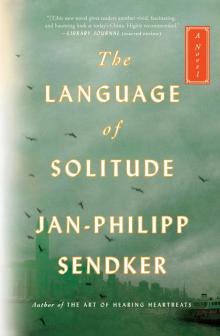 The Language of Solitude
The Language of Solitude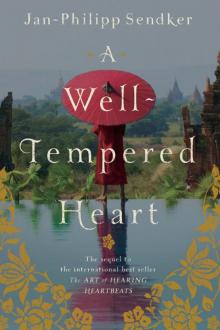 A Well-Tempered Heart
A Well-Tempered Heart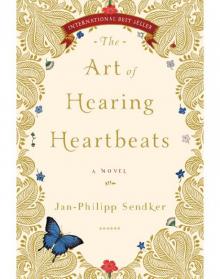 The Art of Hearing Heartbeats
The Art of Hearing Heartbeats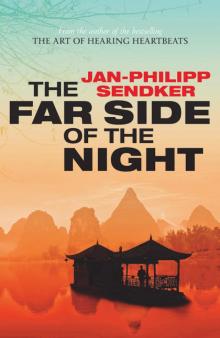 The Far Side of the Night
The Far Side of the Night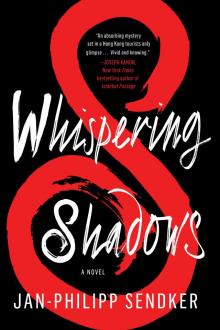 Whispering Shadows
Whispering Shadows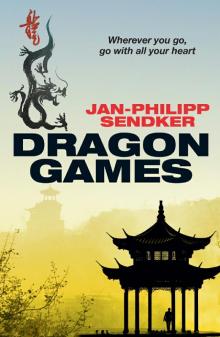 Dragon Games
Dragon Games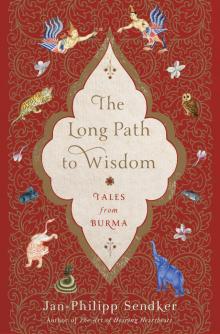 The Long Path to Wisdom
The Long Path to Wisdom